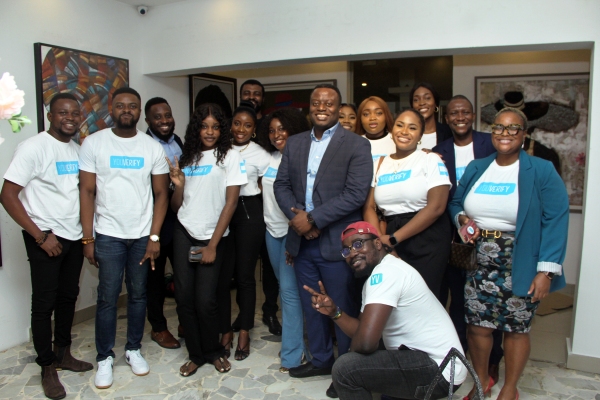This past month has seen several African fintechs such as Flutterwave and Union54 make headlines for compliance checks and fraud issues. Both unlinked events re-emphasize the importance of know your customer (KYC) and anti-money laundering (AML) checks and why regulators enforce strict policies that financial institutions need to be held accountable to while operating across the continent and globally.
For the many startups whose services help keep the operations of financial institutions such as banks and fintechs in check, this period highlights their relevance more than ever. In the latest development, Youverify, a Lagos and San Francisco–based identity verification company helping African banks and startups automate KYC and other compliance procedures, is announcing that it has secured a $1 million seed round extension. The startup raised a $1.5 million round in 2020, bringing its total seed raise to $2.5 million.
Africa-focused VCs Orange Digital Ventures (ODV) and LoftyInc Capital, the two investors who co-led its initial seed round, also led the extension. Additional investment came from Octerra Capital, Plug & Play Venture, Syntax Ventures, HTTP Investors, Afer Group and Fronesyz Capital.
The proliferation of financial services in Africa is beginning to attract more scrutiny from regulators. According to reports, transactions worth $116 billion will be made through digital payment channels this year, requiring stringent measures to prevent identity theft and fraud. Therefore, the rise in focus on maintaining transparency in financial regulations and improving strategies for KYC and AML by implementing regulatory technologies has become a significant growth factor for the market. And as regtech demand globally increases, so will Africa’s, with reports saying it will reach about $1.2 billion in the next five years.
Youverify came into Africa’s regtech scene when founder and CEO Gbenga Odegbami founded the company in 2018. Launched in the Nigerian market, Youverify first provided API for address and identity verification to several financial institutions. Now it has added more KYC products and expanded into new markets such as Ghana, Côte d’Ivoire, South Africa, Kenya and Uganda.
“The way our customers see us is that we help them automate their KYC and compliance issues,” said Odegbami on a call with TechCrunch.
In addition to verifying identities beyond Nigeria’s bank verification number (BVN) and addresses, Odegbami says Youverify layers KYC and compliance products such as transaction monitoring. He further explained that these offerings cater to issues some fintech platforms have faced recently: alleged AML issues in the case of Flutterwave in Kenya and Ping Express in the U.S. and fraud in the case of Union54’s chargebacks. In the latter, Youverify claims it could’ve prevented large-scale chargeback fraud by identifying the pattern of transactions to flag fraud, blocking the virtual cards and tying them back to fraudsters committing the multiple fake chargebacks.
“They [Union54] grew faster than they could put in place the proper transaction monitoring and fraud detection systems that will identify transactions happening from their customers,” the CEO said of the chargeback situation Union54 has dealt with over the past couple of months. “A system like ours will be able to identify previous and new patterns in such a way that we would’ve been able to help such the company.”
It wasn’t until last year that Youverify started dealing with fintechs. Initially, most of its customers were governmental bodies, big corporations like Bolt and banks. Nearly two-thirds of Nigeria’s commercial banks, such as Standard Chartered, Standard Bank and Fidelity Bank, use the platform’s identity verification and KYC products, Youverify said.
However, in a bid to serve more clients, the company launched its proprietary technology, the Youverify OS (YVOS), which provides a single platform for automating due diligence and combines risk and compliance management with its core identity verification platform to deliver these fintechs an enterprise-grade compliance solution. With its other product, vFORM, a low and no-code tool, businesses can create a custom process for onboarding new customers using a drag-and-drop builder.
As a result of diversifying its clientele and demand for its KYC products, Odegbami said Youverify’s customer base increased by 300% to serve more than 400 banks and high-growth startups. In the last 24 months, Youverify’s application processes have grown by more than 1,000% to more than 5 million applications that have helped its clients hire talent, sell financial products, and remotely onboard ride-hailing drivers. The company’s YouID digital identity platform added more than 500,000 users, with 600 service providers on its marketplace waitlist across the continent. Odegbami said the Lagos-based identity verification company crossed an ARR of over $1 million last year.
Youverify isn’t the only identity verification company in Africa. Similar providers include Smile Identity and YC-backed companies IdentityPass and Dojah. Without mincing words, Odegbami said his company is a “market leader” because it came into the market much earlier and possesses more experience, and provides more data sets than the others.
Over the next 18 months, Youverify plans to grow its footprint to cover 30 countries, especially in the southern, eastern and francophone parts of Africa, where Odegbami says the company will be recruiting aggressively. It also intends to increase the number of IDs it can verify, from 400 million to 2 billion, and develop new automated compliance products for the gaming, travel, healthcare and telecommunications industries.

